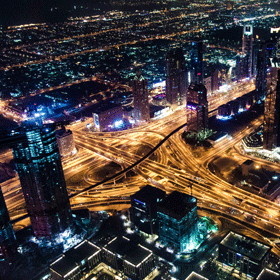From transportation to traffic management, smart city technology has the capability to change how people live and interact by reducing resource consumption, making the city more efficient and much more. Although this technology is still in its infancy stages of development, the push for smart city realization seems inevitable and it won’t be long before governments fully adopt these technologies into everyday aspects of city life.
Let’s look at some of the emerging smart city initiatives in the world and their benefits:
Smart Transportation
Inefficient transportation, heavy traffic, and reduced road safety and security are all problems that are rampant in big cities. The smart city technology helps to solve these issues through smart traffic lights with cameras and sensors situated in the cars. These technologies make it possible to monitor traffic flow, which shows in traffic lights, and is optimized to alleviate congestion during peak hours.
Smart energy
Energy-efficiency is another big challenge in major cities as the demand increases and the supply remains the same. Smart cities implement different IoT solutions to help in smart energy management.
For instance, smart meters and smart grids make it possible for utility companies to evaluate power usage in real-time. This data can be used to predict periods of high and low consumption, which makes it easy to adjust energy distribution appropriately.
There is also the execution of renewable energy sources such as solar panels that reduce energy costs and minimize environmental footprint.
Privacy Concerns of Smart Cities
Despite the immense benefits that come with smart cities, there are privacy concerns that we need to be aware of. For smart cities to be effective, there is greater need for data collection and analysis. They, therefore, collect data from people, smart meters, cameras, phones, sensors, devices, and other relevant points. Security experts had been showing concerns regarding data collection in Alphabet’s project in Toronto.
Smart cities also have to be connected for information to flow where it is required. The different aspects that make cities smart also make them vulnerable.
All the information collected, including personal data and a person’s location could be immensely sensitive and valuable to thieves who may use it to rob a home, stalkers who may want to follow their victim’s every move, and even sexual predators who may be waiting for the right time to strike.
Since smart cities are highly connected, there is also the risk of data breaches by online crooks who are waiting to take advantage of the unsecured public Wi-Fi networks in cities to launch their attacks.
How to Stay Private
It goes without saying that data collection and analysis is paramount in a smart city setting. To avoid all the privacy concerns that arise from collecting huge amounts of data, it is important for smart city designers to take the necessary precautions to safeguard the privacy of their citizens.
Citizens need to understand that even if the government and corporations used the data collected correctly, there is still the risk of data breach. They should, therefore, look for ways to protect their privacy, especially when using public Wi-Fi’s. One of the best ways to reclaim anonymity and privacy online is by using a VPN to encrypt your data and protect your online footprint from prying eyes.
Courtesy of Chris Jones @ TurnOnVPN
